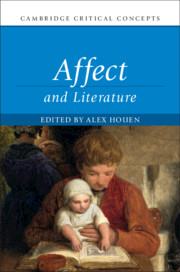Book contents
- Affect and Literature
- Cambridge Critical Concepts
- Affect and Literature
- Copyright page
- Contents
- Notes on Contributors
- Introduction
- I Origins
- II Developments
- Chapter 11 Feeling Feelings in Early Modern England
- Chapter 12 Laughable Poetry
- Chapter 13 Modernism, Formal Innovation, and Affect in some Contemporary Irish Novels
- Chapter 14 The Antihumanist Tone
- Chapter 15 Bette Davis’s Eyes and Minoritarian Survival: Camp, Melodrama, and Spectatorship
- Chapter 16 Affective Form
- Chapter 17 Subaltern Affects
- III Applications
- Index
Chapter 12 - Laughable Poetry
from II - Developments
Published online by Cambridge University Press: 16 January 2020
- Affect and Literature
- Cambridge Critical Concepts
- Affect and Literature
- Copyright page
- Contents
- Notes on Contributors
- Introduction
- I Origins
- II Developments
- Chapter 11 Feeling Feelings in Early Modern England
- Chapter 12 Laughable Poetry
- Chapter 13 Modernism, Formal Innovation, and Affect in some Contemporary Irish Novels
- Chapter 14 The Antihumanist Tone
- Chapter 15 Bette Davis’s Eyes and Minoritarian Survival: Camp, Melodrama, and Spectatorship
- Chapter 16 Affective Form
- Chapter 17 Subaltern Affects
- III Applications
- Index
Summary
By the end of the eighteenth century, laughter was becoming an increasingly ambiguous affect. Hobbes’s cry of ‘sudden glory’, a scornful expression of superiority over ‘some deformed thing in another, by comparison whereof they suddenly applaud themselves’, had been challenged by philosophers (Hutcheson, Kant, and others) who read laughter as a non-judgemental response to a perceived incongruity. And yet, while both the superiority and incongruity theorists tended to consider laughter as a transitive force – as ridicule aimed at an object, or as amusement at something oddly compounded within it – poets were focusing on the phenomenology of laughter. This emphasis led them to see the laugh itself as an incongruity. My essay considers a range of Romantic and post-Romantic poems in order to explore what the lyrical and the laughable might have in common.
- Type
- Chapter
- Information
- Affect and Literature , pp. 229 - 248Publisher: Cambridge University PressPrint publication year: 2020

